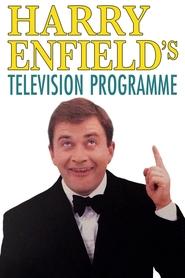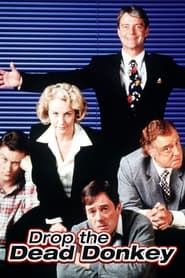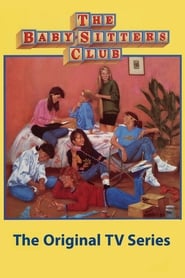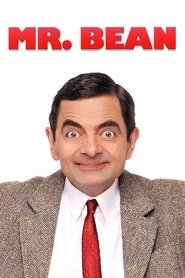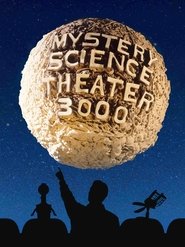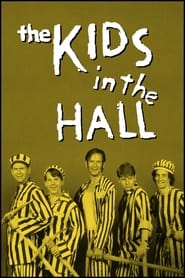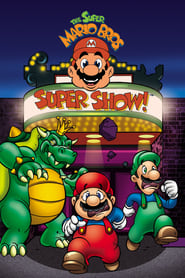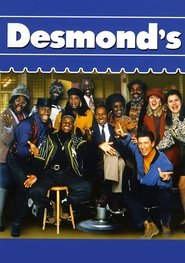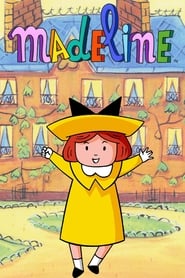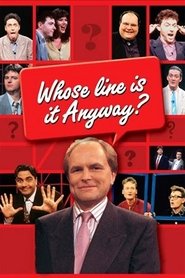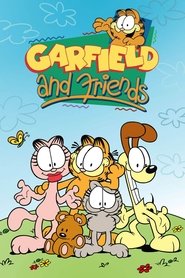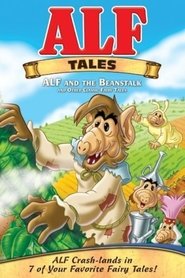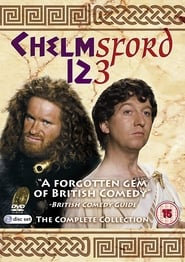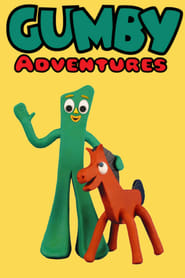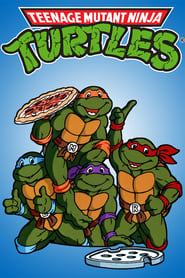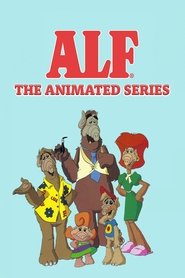New Comedy TV Series on Tubi TV - Page 41
-
Harry Enfield's Television Programme
1990
star 7.3Harry Enfield's Television Programme was a British sketch show starring Harry Enfield and Paul Whitehouse. It was first broadcast on BBC Two in 1990 in the Thursday 9 pm slot, which became the traditional time for alternative comedy on television. Enfield was already an established name due to his 'Loadsamoney' character, but the series gave greater presence to his frequent collaborators Paul Whitehouse and Kathy Burke – so much so, that in 1994 the show was retitled Harry Enfield and Chums. -
Drop the Dead Donkey
1990
Drop the Dead Donkey
1990
star 6.7A sitcom set in the offices of "GlobeLink News" after its acquisition by media mogul Sir Roysten Merchant. Led by editor George Dent, the staff of GlobeLink battle to maintain the company as a serious news organization against Sir Roysten's right-hand man, Gus Hedges, who wants to make the show more sensationalist and suppress stories that might harm Roysten's business empire. -
The Baby-Sitters Club
1990
star 7.8The Baby-Sitters Club is a 1990 American television series based on Ann M. Martin's children's book series of the same name. The series originally aired on the The Disney Channel, but was also broadcast on HBO and Nickelodeon; all thirteen thirty-minute episodes were also released to home video. The TV series and the novels were both produced by Scholastic Corporation. As of June 1st, 2013, the series was made available on Netflix instant streaming. -
Mr. Bean
1990
Mr. Bean
1990
star 8Mr Bean turns simple everyday tasks into chaotic situations and will leave you in stitches as he creates havoc wherever he goes. -
Mystery Science Theater 3000
1989
star 7.7A stranded spaceship pilot captured by mad scientists survives a blitz of cheesy B movies by riffing on them with his funny robot pals. -
The Kids in the Hall
1989
The Kids in the Hall
1989
star 7.4The Kids in the Hall is a Canadian sketch comedy group formed in 1984, consisting of comedians Dave Foley, Kevin McDonald, Bruce McCulloch, Mark McKinney, and Scott Thompson. -
Major Dad
1989
Major Dad
1989
star 6.4Major Dad is an American sitcom created by Richard C. Okie and John G. Stephens, developed by Earl Pomerantz, that originally ran from 1989 to 1993 on CBS, starring Gerald McRaney as Major John D. MacGillis and Shanna Reed as his wife Polly. The cast also includes Beverly Archer, Matt Mulhern, Jon Cypher, Marisa Ryan, Nicole Dubuc and Chelsea Hertford. -
The Super Mario Bros. Super Show!
1989
star 7In 1989 the two most famous plumbers from Brooklyn burst out of the Nintendo game world and onto television screens across America. The Super Mario Bros. Super Show! aired weekday afternoons and brought Mario, Luigi, Princess Toadstool and King Koopa more thrilling adventures as cartoon characters. And if that weren't enough, each episode also contained live-action segments featuring Mario and Luigi running their Brooklyn plumbing shop - all before they were flushed down a drainpipe into the Mushroom World. -
Saved by the Bell
1989
Saved by the Bell
1989
star 7.8Lovable schemer Zack Morris leads his pals on adventures at California's Bayside High School. The friends navigate relationships, final exams, school dances, breakups and more while frequently frustrating their principal, Mr. Richard Belding, who does his best to keep them in check. -
Ranma ½
1989
Ranma ½
1989
star 8.6Ranma Saotome, a teenage martial artist, and his father Genma travel to the 'cursed training ground' of Jusenkyo in China. There, despite the warnings of the Chinese guard, they fall into the cursed springs. From now on, whenever Ranma is doused in cold water, he turns into a girl and a cute, well-built redhead at that. Hot water changes him back into a man again, but only until the next time. To make matters worse, his father engages him to Akane Tendo, a girl who hates boys. -
Desmond's
1989
Desmond's
1989
star 7.3Desmond's was a British television situation comedy broadcast by Channel 4 from 1989 to 1994. With 71 episodes, Desmond's became Channel 4's longest-running sitcom. The first series was shot in 1988, with the first episode broadcast in January 1989. The show was made in and set in Peckham, London, England and featured a predominantly Black British Guyanese cast. Conceived and co-written by Trix Worrell, and produced by Charlie Hanson and Humphrey Barclay, this series starred Norman Beaton as barber Desmond Ambrose. Desmond's shop was a gathering place for an assortment of local characters. -
Madeline
1988
Madeline
1988
star 5.8A young girl embarks on a series of misadventures, causing her friends and teachers to be worrisome. Based on the children's books by Ludwig Bemelmans. -
Whose Line Is It Anyway?
1988
star 7.6An un-scripted comedy show in which four guest performers improvise their way through a series of games, many of which rely on audience suggestions. -
Garfield and Friends
1988
Garfield and Friends
1988
star 7.3The animated stories of Garfield the cat, Odie the dog, their owner Jon and the trouble they get into. And also Orson the Pig and his adventures on a farm with his fellow farm animals. -
Zanzibar
1988
-
Alf Tales
1988
Alf Tales
1988
star 7.1ALF Tales is an animated American series that ran on the NBC television network on Saturdays from August 1988 to December 1989. The show was a spinoff from the series ALF: The Animated Series. The show had characters from that series play various characters from fairy tales. The fairy tale was usually altered for comedic effect in a manner relational to Fractured Fairy Tales. Each story typically spoofs a film genre, such as the "Cinderella" episode done as an Elvis movie. Some episodes featured a "fourth wall" effect where ALF is backstage preparing for the episode, and Rob Cowan would appear drawn as a TV executive to try to brief ALF on how to improve this episode. For instance Cowan once told ALF who was readying for a medieval themed episode that "less than 2% of our audience lives in the Dark Ages". -
Chelmsford 123
1988
Chelmsford 123
1988
star 6.6Chelmsford, Britain in the year AD 123; there is a power struggle between Roman governor Aulus Paulinus and the British chieftain, Badvoc. Britain is a miserable place, cold and wet – just the place to exile Aulus for accidentally insulting the Emperor's horse, but also give him something useful to do. Aulus, probably a play on Aulus Platorius Nepos, the governor of Roman Britain between 122 and 125, was a rather delicate Roman, who was usually outwitted by the scheming Badvoc, who hadn't had a haircut for twenty-five years. -
Gumby Adventures
1988
Gumby Adventures
1988
star 7.8The continuous adventures of Gumby and his pals. This time, he runs a farm which includes more pals such as a wooly mammoth, Denali, and a bee, Groobee. -
Teenage Mutant Ninja Turtles
1987
star 7.8Four turtles fall into the sewers and are befriended by Hamato Yoshi a Japanese man sent to New York who was forced to live in the sewers. One day he sees a strange green glow which transforms the four turtles into human-like creatures. Hamato (now Master Splinter) changes into a giant rat from the green glow and teaches the turtles the skills of the ninja as they team up with news reporter April O'Neil to battle against Yoshi's arch enemy Shredder and Krang, an alien warlord from Dimension X. -
ALF: The Animated Series
1987
star 6.3ALF: The Animated Series is an animated cartoon spin-off based on the live-action Sitcom series ALF. It premiered on September 26, 1987 and ran for 26 episodes. ALF Tales was a spinoff from the series that ran on the NBC television network on Saturdays from August 1988 to December 1989. The show had characters from that series play various characters from fairy tales. The fairy tale was usually altered for comedic effect in a manner relational to Fractured Fairy Tales.
 Netflix
Netflix
 Amazon Prime Video
Amazon Prime Video
 Apple iTunes
Apple iTunes
 Apple TV Plus
Apple TV Plus
 Disney Plus
Disney Plus
 Google Play Movies
Google Play Movies
 Paramount Plus
Paramount Plus
 Hulu
Hulu
 HBO Max
HBO Max
 YouTube
YouTube
 fuboTV
fuboTV
 Peacock
Peacock
 Peacock Premium
Peacock Premium
 Amazon Video
Amazon Video
 The Roku Channel
The Roku Channel
 AMC+
AMC+
 Kocowa
Kocowa
 Hoopla
Hoopla
 The CW
The CW
 Vudu
Vudu
 Starz
Starz
 Showtime
Showtime
 PBS
PBS
 Pantaflix
Pantaflix
 FXNow
FXNow
 Tubi TV
Tubi TV
 Kanopy
Kanopy
 Comedy Central
Comedy Central
 Crunchyroll
Crunchyroll
 Microsoft Store
Microsoft Store
 Redbox
Redbox
 Sun Nxt
Sun Nxt
 ABC
ABC
 DIRECTV
DIRECTV
 Crackle
Crackle
 Fandor
Fandor
 Plex
Plex
